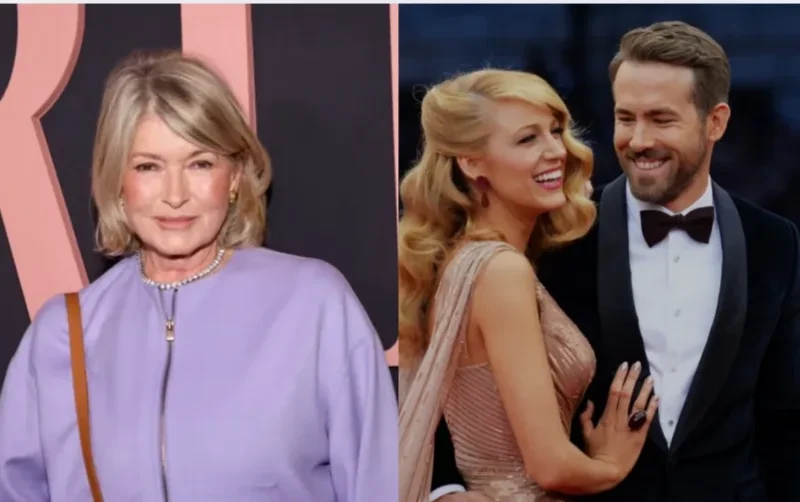Introduction: The Surprising Confession
Martha Stewart, an icon in the realms of homemaking and lifestyle, has made headlines recently with a candid revelation about her neighbor, the charming actor Ryan Reynolds. Known for his comedic roles in blockbuster movies and his engaging social media presence, Reynolds has crafted a public persona that is often associated with humor and wit. However, Stewart’s lighthearted confession starkly contrasts this image, as she candidly described him as “not so funny” in real life.
This statement surfaced during a light-hearted discussion, where the two friends were reminiscing about their interactions. Stewart’s remarks were made in a playful spirit, highlighting the welcoming atmosphere that often envelops her neighborhood. It was clear that the intention behind her words was not to diminish Reynolds’ talent as a comedic actor, but to note an interesting dichotomy between his on-screen persona and his off-screen demeanor.
The unexpected nature of Stewart’s confession invites curiosity, as it diverges from how Reynolds is typically perceived by the public. Fans may wonder how someone who routinely delivers laughs in films and television can be so different in personal interactions. This revelation creates a unique narrative that emphasizes the often-discrepant realities of celebrity lives. By shedding light on their neighborhood banter, Stewart provides an insider’s perspective that not only humanizes Reynolds but also enriches the stories of celebrity friendships.
As readers delve into this intriguing topic, they are encouraged to reflect on the complexities of public figures, the nuances of their personalities, and the experiential distinctions that can exist between their personal and professional lives. This playful dynamic between Stewart and Reynolds serves as a reminder that appearances can be deceiving, making this revelation both enlightening and entertaining.
Martha’s Relationship with Ryan Reynolds
Martha Stewart and Ryan Reynolds share a unique bond that transcends the typical neighborly relationship, revealing a blend of camaraderie and mutual respect. Their acquaintance blossomed when Stewart moved into her home in Bedford, New York, a picturesque setting that also serves as Reynolds’ residence. The proximity has allowed the pair to cultivate a friendship that reflects both personal and professional ties, aided by shared interests in food, entertaining, and lifestyle.
Ryan Reynolds: The Public Versus Private Persona
Ryan Reynolds has cultivated a public persona that radiates humor, charm, and wit, epitomized by his performances in popular films such as “Deadpool,” “The Proposal,” and “Free Guy.” His ability to deliver sharp one-liners and engaging stories has endeared him to millions, making him a household name. Fans often associate him with his comedic roles, leading to high expectations about his demeanor off-screen. This carefully crafted image, buoyed by his engaging social media presence, portrays a man who is always ready with a quick quip or charming anecdote.
However, a stark contrast emerges when considering Martha Stewart’s recent revelations that Ryan Reynolds is “not so funny” in private. This commentary offers a glimpse into the divide between the public and private personas that many celebrities navigate. While Reynolds excels in comedic roles, his off-camera life may not always align with the humor he projects. This discrepancy raises questions about the authenticity of celebrity personas and whether audiences are inadvertently misled by the characters they portray and the images they curate.
The disparity between Reynolds’ on-screen charm and his private demeanor also resonates with discussions around celebrity expectations. Fans often hold public figures to an idealized version of themselves, which can create an unfair burden. The pressure to be perpetually entertaining or affirming of one’s public image can result in discomfort for celebrities like Reynolds, who may feel compelled to perform even in personal spaces. Critiques of this phenomenon raise essential considerations about the emotional toll of fame and the authenticity of one’s personality amidst the glare of the spotlight. Ultimately, the observation about Ryan Reynolds from Martha Stewart encourages a more nuanced understanding of the complexities involved in celebrity identities.
Conclusion: The Nature of Humor and Friendship
The revelations shared by Martha Stewart regarding Ryan Reynolds offer a compelling glimpse into the intricate dynamics of humor and friendship. While Reynolds is widely celebrated for his comedic prowess in the limelight, Stewart’s insights suggest a contrast that challenges typical perceptions of humor in personal relationships. This invites us to reflect on our own friendships and the roles that humor plays within them. Understanding that public personas often differ from private realities can enhance the way we approach our connections with others.
Humor can be both a unifying force and a source of misunderstanding in friendships. It acts as a bridge that brings people together, but it may also create a veneer that obscures deeper layers of authenticity. Just as Stewart pointed out the subtle nuances of Reynolds’ character, individuals often possess private characteristics that may not align with their public image. This variance prompts us to consider how well we truly know our friends and the possibility that their humor, much like those of Reynolds, may exist on multiple levels.
Furthermore, the complexities of humor remind us that laughter is not a one-size-fits-all approach. Each relationship is unique, shaped by shared experiences, values, and emotional depth. As individuals navigate their friendships, it’s vital to embrace authentic connections that transcend the superficial. Consider how humor enriches your own friendships, fostering both joy and understanding while also accommodating the nuances of personality that may not always be on display.
Ultimately, as we ponder the nature of humor within our relationships, it becomes clear that the depth of friendship can often reveal profound truths, allowing for growth and authenticity. In recognizing that our friends may be more than their public personas, we can cherish the richness of genuine connection.




